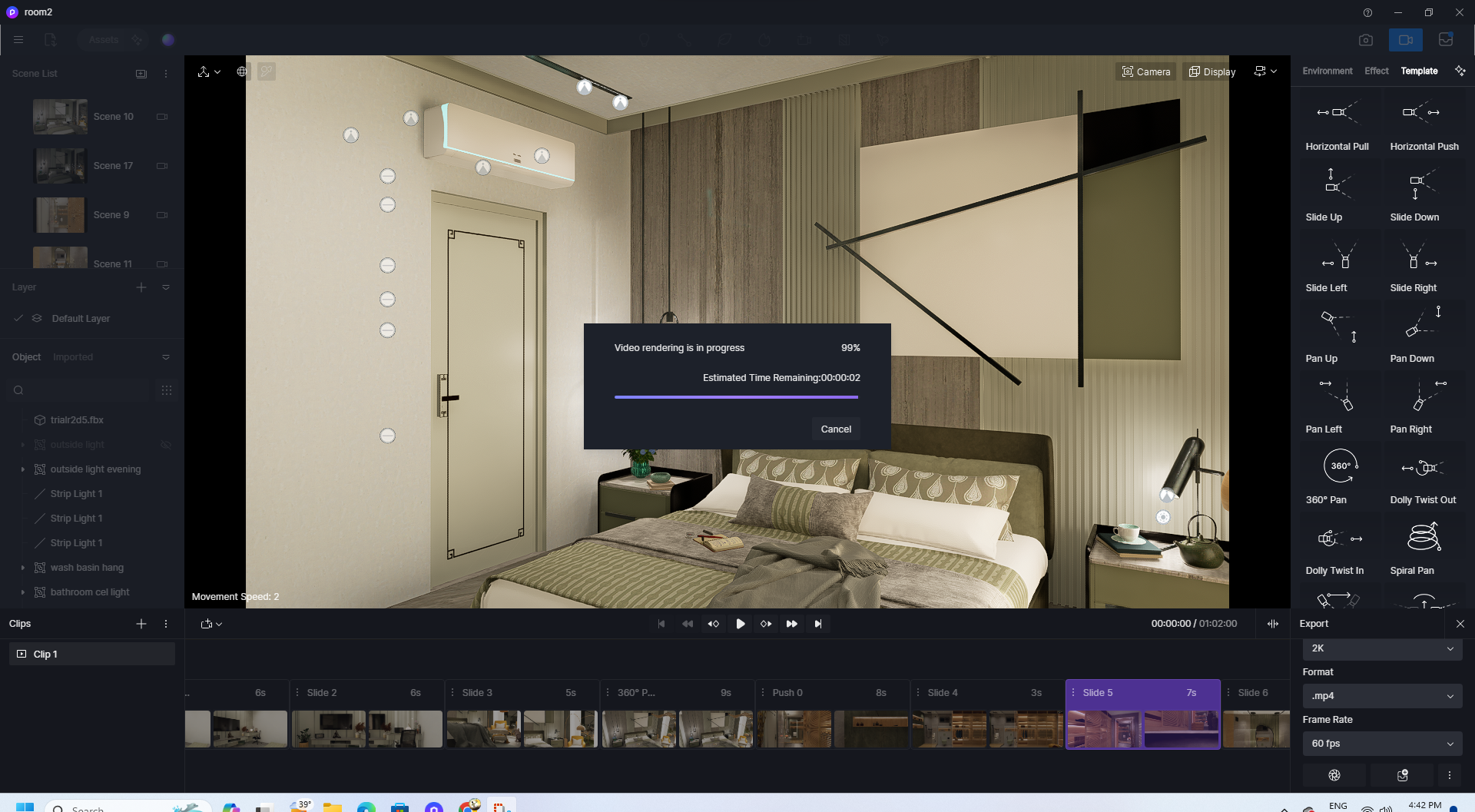D5 Render: Complete Buyer's Guide
AI-powered real-time rendering platform
D5 Render positions itself as the AI-powered real-time rendering platform that eliminates expensive outsourcing relationships while delivering professional-quality architectural visualization through unified AI-assisted workflows.
Market Position & Maturity
Market Standing
D5 Render occupies a specialized niche within the architectural visualization market, positioning itself as an AI-enhanced alternative to traditional rendering workflows rather than competing directly with comprehensive 3D modeling platforms.
Company Maturity
The company demonstrates operational maturity through established customer relationships with architectural firms like Reta Proje, DSN Intervention, and Yoga4Arch Studio, indicating stable business operations and proven market validation[52][75][76].
Growth Trajectory
Customer implementations show measurable adoption patterns across architectural firms seeking to eliminate outsourcing relationships.
Industry Recognition
While specific awards or analyst recognition aren't documented in available research, customer testimonials from established architectural firms provide market validation of D5's capabilities.
Strategic Partnerships
D5 Render's desktop-focused approach limits mobile and AR optimization compared to broader visualization platforms, indicating deliberate market focus rather than comprehensive platform ambitions.
Longevity Assessment
The platform's ability to enable real-time client collaboration during presentations represents a significant competitive differentiator in the architectural visualization market[75][76].
Proof of Capabilities
Customer Evidence
Reta Proje, a recognized architectural firm, achieved project timeline compression from 6+ months to 1-4 months for large-scale urban planning projects through D5's real-time editing capabilities during client presentations, eliminating traditional revision cycles entirely[75].
Quantified Outcomes
Phos Architects reports 50% reduction in rendering time and complete elimination of overnight rendering costs through D5's real-time capabilities, enabling same-day design revisions that previously required extended processing periods[49][76].
Case Study Analysis
Yoga4Arch Studio completed a 650-hectare urban project in half the traditional timeline, attributing efficiency gains to D5's real-time navigation capabilities and comprehensive asset library[52].
Market Validation
Customer implementations consistently demonstrate D5's effectiveness in replacing expensive outsourcing relationships, with architectural firms typically spending $1,500-$2,000 per external render finding substantial cost efficiency through in-house D5 capabilities[60].
Competitive Wins
Customer testimonials specifically reference elimination of outsourced rendering and replacement of traditional workflows, indicating successful competitive displacement in architectural visualization scenarios[60][76].
Reference Customers
Established relationships with architectural firms like Reta Proje and DSN Intervention, combined with documented project success outcomes, suggest strong customer retention and satisfaction[75][76].
AI Technology
D5 Render's technical foundation centers on AI-enhanced real-time rendering that embeds artificial intelligence directly into the visualization pipeline rather than requiring external tool integration. The platform's core AI capabilities include AI Texture Map Generation that produces PBR (Physically Based Rendering) textures with detailed normal and roughness maps from diffuse inputs, AI Ultra HD functionality that upscales textures to 4K resolution, and AI Atmosphere Match that automatically adjusts lighting conditions to match reference environments[62][77].
Architecture
D5's deployment model focuses on desktop-based rendering with LiveSync functionality for 3ds Max and SketchUp integration, enabling real-time synchronization between modeling environments and the rendering platform[65][80]. The system architecture supports complex scenes up to 500 million polygons, though stability issues require manual scene segmentation beyond this threshold[66][80].
Primary Competitors
Blender offers superior subsurface scattering simulation for materials like skin and marble, while providing broader platform capabilities for organizations requiring comprehensive 3D modeling functionality[71][78]. Twinmotion competes in architectural visualization, though comparative analysis suggests D5 advantages in material realism, with specific feature parity assessment remaining limited[58][61]. Adobe Substance 3D Suite dominates integrated Creative Cloud workflows but requires subscription commitment without freemium evaluation options[43][45].
Competitive Advantages
Real-time rendering performance demonstrates measurable superiority, with RTX 4090 configurations achieving 2K image rendering in 19 seconds versus 31 seconds on competing platforms[57][59]. Path tracing implementation delivering 60+ FPS in complex scenes enables immediate design iteration unavailable in traditional workflows[52][57]. The freemium model provides evaluation flexibility that enterprise-only alternatives cannot match[60].
Market Positioning
D5's desktop-focused architectural specialization creates competitive advantage in client presentation scenarios while potentially limiting expansion into adjacent markets[56][71]. LiveSync functionality for major modeling platforms provides integration advantage over standalone tools, though occasional synchronization failures require workflow accommodation[65][80].
Win/Loss Scenarios
D5 excels when organizations prioritize real-time client collaboration and seek to eliminate outsourcing relationships with adequate hardware budgets[75][76]. Alternatives prove superior for complex material simulation, mobile/AR optimization, or comprehensive 3D modeling requirements beyond architectural visualization focus[67][71][72][78].
Key Features

Pros & Cons
Use Cases
Integrations
Pricing
Featured In Articles
Comprehensive analysis of AI Texture Generators for AI Design for AI Design professionals. Expert evaluation of features, pricing, and implementation.
How We Researched This Guide
About This Guide: This comprehensive analysis is based on extensive competitive intelligence and real-world implementation data from leading AI vendors. StayModern updates this guide quarterly to reflect market developments and vendor performance changes.
81+ verified sources per analysis including official documentation, customer reviews, analyst reports, and industry publications.
- • Vendor documentation & whitepapers
- • Customer testimonials & case studies
- • Third-party analyst assessments
- • Industry benchmarking reports
Standardized assessment framework across 8 key dimensions for objective comparison.
- • Technology capabilities & architecture
- • Market position & customer evidence
- • Implementation experience & support
- • Pricing value & competitive position
Research is refreshed every 90 days to capture market changes and new vendor capabilities.
- • New product releases & features
- • Market positioning changes
- • Customer feedback integration
- • Competitive landscape shifts
Every claim is source-linked with direct citations to original materials for verification.
- • Clickable citation links
- • Original source attribution
- • Date stamps for currency
- • Quality score validation
Analysis follows systematic research protocols with consistent evaluation frameworks.
- • Standardized assessment criteria
- • Multi-source verification process
- • Consistent evaluation methodology
- • Quality assurance protocols
Buyer-focused analysis with transparent methodology and factual accuracy commitment.
- • Objective comparative analysis
- • Transparent research methodology
- • Factual accuracy commitment
- • Continuous quality improvement
Quality Commitment: If you find any inaccuracies in our analysis on this page, please contact us at research@staymodern.ai. We're committed to maintaining the highest standards of research integrity and will investigate and correct any issues promptly.